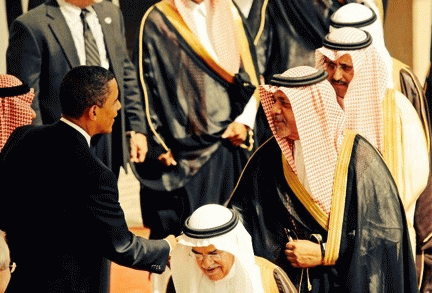Military and policy analyst Brian Downing shows why relations with Iran may overtake those with Saudi Arabia in the near term.
Michael CollinsA Rapprochement with Iran may further American interests better than
keeping the tilt toward Saudi Arabia. Brian M Downing
From
the end of World War Two, until the outset of the Iranian Revolution in
1979, the US maintained good relations with both Saudi Arabia and Iran.
The US imported hydrocarbons from both, exported weapons to both, and
maintained cordial diplomatic relations with both. This contributed to
stability in the Gulf region.
Stability
was upset by Khomeini's revolution, his call for uprisings across the
Islamic world, and Iraq's 1980 invasion of Iran (backed by many Sunni
states) which led to eight years of war and enormous casualties on both
sides. The US is no longer positioned to moderate tensions between Saudi
Arabia and Iran. The US is left in the unwelcome, restrictive, and
potentially disastrous position of being too close to Saudi Arabia.
Entangling alliances
The
US has found itself siding, if only hesitatingly and partially, with
Saddam Hussein after he invaded Iran in 1980, providing his army with
transportation equipment and intelligence. A few years into the war, the
Reagan administration tried to negotiate an opening with Iran,
providing surface-to-air missiles and antitank weapons -- a move
supported at the time by neoconservatives in the administration. The
effort failed and the US found itself in the Saudi camp once again.
Today,
the US is trying to stay out of the fray in Yemen as the Saudi air
force, with help from Sunni allies, is attacking the Shia Houthis. The
Houthis enjoy a measure of support from Iran, though its offensive isn't
driven by Tehran's urging but rather by longstanding Yemeni regional
tensions, especially the growing influence of Saudi Arabia. This should
be abundantly clear to Saudis who may look into the not-so-distant past
to learn that they once backed the Northern Shias against the Southern
Sunnis. Americans, too, might bear this in mind.
Saudi
interests in the region, and their perceptions of Iranian-Shia moves in
the region, are often enough highly skewed. Every country, including
the US, views world events through the lens of its history and culture.
There is no pure objectivity or complete knowledge in world affairs.
Saudi policymakers see events through their Wahhabi beliefs which are
taught in schools and professed by most princes. Those beliefs pervade
the country's national security bureaus.
Shias
in general, and Iranians in particular, are despised as expansionary
heretics. The Saudis make every effort to draw the US into their
sectarian conflicts. Iran is hardly a blameless victim in the Middle
East, but Wahhabi perceptions should be understood for what they are and
should not have undue influence on US perceptions, let alone its
policies.
Instability in the Kingdom
American
planners cannot look upon events in the Middle East and see Saudi
Arabia as a reliable partner for years to come. Though the House of Saud
keeps its doors closed and curtains drawn, signs of distress are plain.
The turbulence of the region may find its way into the Kingdom. Indeed,
it already has.
Many
younger Saudis wish to replace archaic family government with a more
modern one that gives voice to people outside a small privileged clique.
They are educated and informed, yet live as subjects. They witnessed
their government repress reform movements in Bahrain, Yemen, and Egypt,
leaving little doubt as to the prospects of reform at home.
Even
within the royal family, an expansive stratum that includes thousands
of princes with varying pedigrees and influence, there are many who do
not want to see power retained by the Sudairi clique which has governed
since the dynasty's founder died in 1953.
Women
are increasingly resistant to Wahhabi strictures. They want to vote,
drive, and walk freely down the boulevards of their country. They look
across the Gulf to their putative enemy and see that even the harshest
ayatollahs allow greater freedoms to Iranian women.
Shias
make up fifteen percent of the population and are concentrated in the
oil-rich Eastern Province and along the Yemeni frontier. Saudi rulers
interpreted the short-lived domestic reform movement, which included
Sunni and Shia youths, as an Iranian plot and placed tighter controls on
the sectaries. Limited in their opportunities for work and education,
the Shias are second-class subjects of an increasingly hostile Sunni
regime.
The
Saudis have long supported Salafist teachings, at home and throughout
the Middle East, in the hope of gaining popular support. This may work
against them. Many adherents of this austere, militant school see the
House of Saud as once again working hand in glove with the US, allowing
its troops back on Saudi land once more. And word spreads of Saudi
cooperation with Israel against Iran. Further, they see the forces of
the Islamic State of Iraq and the Levant sweeping all before them and
representing a foreordained movement that will restore past glory.
Strategic weakness
Geopolitical
alignments try to increase collective military power. Although the
Saudis spend huge amounts on armaments (third highest in the world) and
have a reasonably large standing army and national guard, they, like
many armies of the region, are of dubious effectiveness. In the First
Gulf War, Saudi units showed little aggressive spirit and deferred as US
troops led the way.
More
recently, the Saudis have shown no appetite to use their army against
ISIL, even though its forces are just to the north and have attacked
Saudi checkpoints on the border. Nor have Saudi ground forces deployed
into Yemen, even though the Houthis have been goading them into an
incursion with missile and mortar attacks. The Saudis attempted to
convince Pakistan and Egypt to invade Yemen but neither is willing
-- financially dependent though they are on petrodollars.
The
Saudi air effort in Yemen has come at the expense of the one it had
been previously at least partially engaged in -- the ISIL war. Riyadh's
strategic priorities do not mesh well with Washington's. Its Yemeni
campaign is weakening regional stability and placing further strain on
Washington's military resources.
The
Saudis may worry that popular uprisings will come to the Kingdom and
its well-armed forces will be called upon to suppress them. However, the
regular army is made up of conscripts from across the country and the
national guard comprises an array of tribal militias with varying
allegiances to the royal family. Neither force can be relied upon to
hold it up. The senior officer corps comprises members of the royal
family and patronage networks, not professionals who have risen through
merit. This state of affairs has historically led to simmering
grievances in the officer corps and to movements for reform -- sometimes
jarring ones.
Arms
purchases are designed more to garner military support from
arms-exporting nations than to field an effective army. An unsettling
implication here is that the Saudi princes may one day call upon outside
armies to keep them in power. This would not be without support in
Washington if the rebellion were presented, by the Saudis and US
security bureaus, as instigated by Iran.
One
of the more portentous developments of the last decade is the
remarkable increase in US oil and gas production, recently surpassing
that of Russia and Saudi Arabia. The US will be exporting gas soon and
will become self-sufficient in oil within two decades. Saudi oil is of
limited importance to the US. What little comes in is at the behest of
Saudi-owned refineries along the Gulf Coast and the network of gas
stations the Saudis operate in partnership with Royal Dutch Shell.
This
affords the US the opportunity to detach itself from a part of the
world with poor human rights records, hidebound regimes near an abyss,
and negligible economic significance to the US. However, American
interest in the Gulf is based on ensuring world oil supplies. Globalism
imprinted in its soul, the US will undoubtedly maintain its presence in
the Persian Gulf.
A
rapprochement with Iran may further American interests better than
keeping the tilt toward Saudi Arabia. The US would be better able to
prevent the Gulf rivals and sectarian enemies from going to war with
each other and limit their proxy wars in Yemen and Syria. Neither side
could rely on Washington in its schemes. Each would be mindful of
irritating the US, through foreign policy adventures or human rights
violations at home, lest Washington lean toward its rival. And if one
power should fall into chaos, the US would still have a partner in its
efforts in the Gulf.
2015 Brian M Downing
Brian M Downing is a political-military analyst, and author of The Military Revolution and Political Change
and The Paths of Glory: Social Change in America from the Great War to Vietnam
. He can be reached at brianmdowning|AT|gmail.comEmail address.






